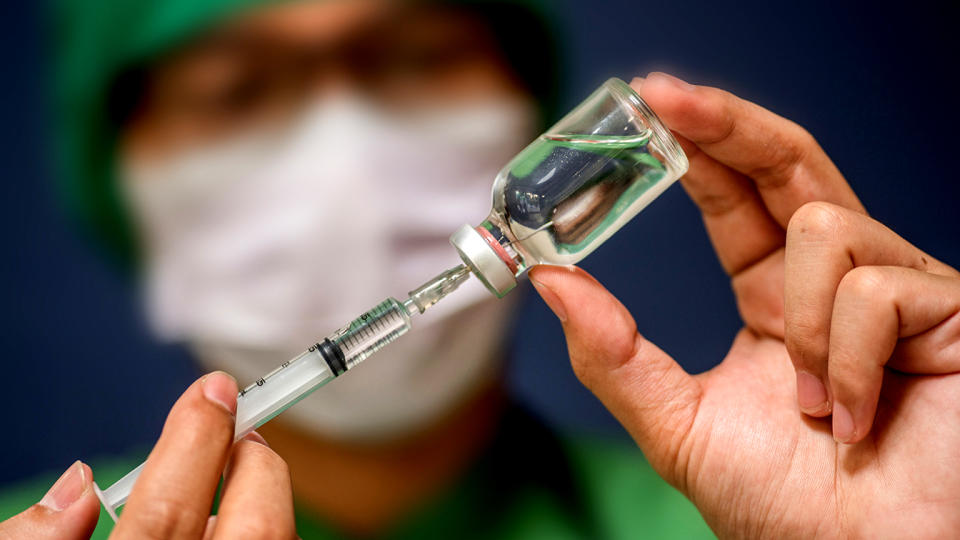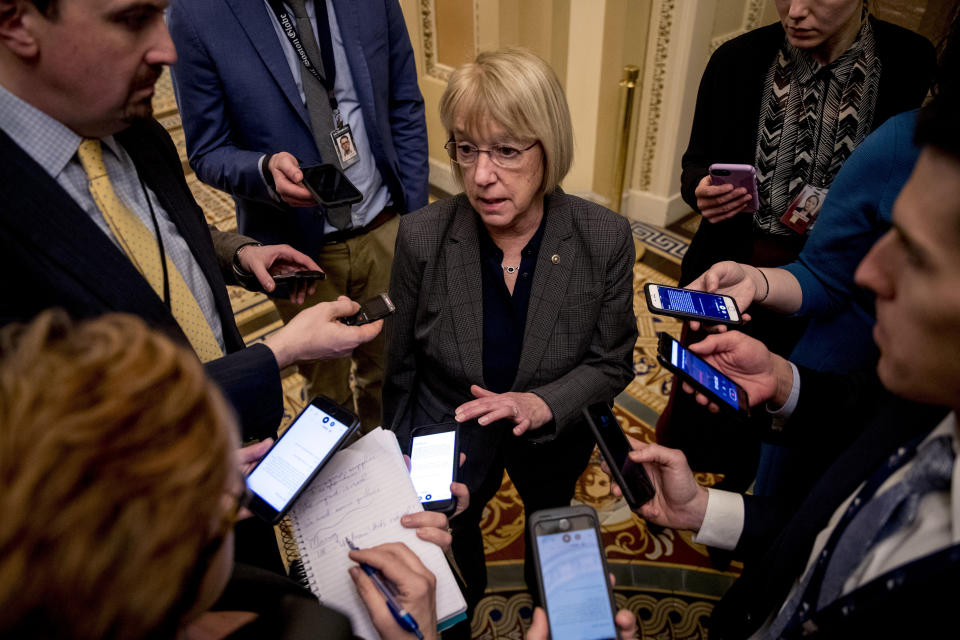The coronavirus is leading to dangerous shortages of key medications
WASHINGTON — Even as the spread of the coronavirus in the United States has increased shortages of critical medicines, the federal government has failed so far to provide members of Congress with crucial information about the nation’s drug supply and the scope of potential shortages.
Democratic Sen. Gary Peters, the ranking member of the Homeland Security and Governmental Affairs Committee, was raising alarms about the drug supply even prior to the pandemic. The U.S. medical system is already facing shortfalls in protective equipment, ventilators and coronavirus tests, but now Peters says drug shortages are set to become even more acute.
“The drug shortage is right on the heels of all this. It is coming up. It’ll be the next thing,” Peters said in an interview with Yahoo News on Wednesday.
In December, before cases of COVID-19, the illness caused by the coronavirus, were reported in China, the Democratic staff on Peters’s committee compiled a report on “cost, supply and security threats” to the nation’s inventory of prescription drugs. The report concluded “active drug shortages in the United States” were “at their highest levels in almost five years” due to multiple factors including diminished U.S. manufacturing capacity and “overdependence on foreign pharmaceutical supply chains.” Those existing issues have all been exacerbated by the coronavirus crisis.
In a statement to Yahoo News, the Food and Drug Administration acknowledged that drug shortages have been an issue and said it is working to address the issue.
“During the Coronavirus Disease 2019 (COVID-19) pandemic, FDA has been closely monitoring the medical product supply chain with the expectation that it may be impacted by the COVID-19 outbreak, potentially leading to supply disruptions or shortages of drug products in the U.S. Many hospitals are currently experiencing difficulties accessing FDA-approved drug products used for patients with COVID-19,” the statement said.
And the FDA predicted the problem could worsen as the pandemic continues.

“Due to the large number of persons infected with COVID-19 and subsequent hospitalizations, it is possible that other FDA-approved drug products may become unavailable in the future,” the statement said. “FDA understands the significant impact that this can have on patient care and is doing everything within its authority to help prevent and alleviate shortages.”
According to Peters, doctors in his home state of Michigan, which has some of the highest numbers of COVID-19 cases in the United States, have told him they are have experienced shortages of drugs involved in the treatment of COVID-19 including paralytics and sedatives used to place patients on ventilators and more basic medicines such as IV fluids and drugs to avoid secondary infections during hospital stays. Peters predicted the problem is going to become a growing issue around the country and said the federal government needs to “aggressively start acquiring some of these drugs.”
“They’re looking at shortages on some critical drugs … the ones that we're most concerned about now are those that are related to dealing with patients on ventilators,” Peters said of the doctors in his home state. “It’s going to be a problem for the whole country.”
Doctors in New York, which is the epicenter of America’s coronavirus crisis, have also reported dangerous drug shortages.
On April 8, Peters and Washington Sen. Patty Murray, the ranking Democrat on the Health, Education, Labor & Pensions Committee, sent a letter to Vice President Mike Pence, who is the head of the President Trump’s coronavirus task force, Food and Drug Administration Commissioner Stephen Hahn, the Federal Emergency Management Agency and the Department of Health and Human Services urging them “to take immediate and necessary steps to mitigate and prepare for critical drug shortages as our country’s health care providers fight the growing number of Novel Coronavirus 2019 (COVID-19) cases throughout the United States.”
The letter noted indications key supplies are already low.
“Reports indicate that in the past month, orders for sedatives like morphine, propofol and midazolam have increased between 60 and 100 percent,” the senators wrote. “Similarly, during that same time frame, orders for antibiotics and antivirals nearly tripled. While there is a spike in demand, orders are not being filled at the same rate.”
In the letter, Peters and Murray asked for a number of details about the Trump administration’s “plan to address and prevent continued drug shortages,” including which government agency is “responsible for procuring and distributing critical drugs that will likely experience a significant increase in demand during this pandemic” and “number of drug products currently held in the Strategic National Stockpile.”
The letter asked the Trump administration to provide the information by April 14, but the senators have, so far, received no information.

Peters told Yahoo News that while the Trump administration did not provide the requested information by the deadline, he did speak with FDA Commissioner Hahn on Tuesday evening. The senator described it as “a really good conversation,” though he also said he is concerned that the administration has not provided the detailed information requested.
“He did promise to get that to us shortly,” Peters said of Hahn. “I also understand that there’s a lot going on.”
The White House declined to comment. An FDA spokesperson told Yahoo News the agency “will continue to work with all members of Congress to provide updates and information regarding the agency’s COVID-19 response efforts.”
A FEMA spokesperson provided Yahoo News with a statement that said the agency and the Department of Health and Human Services “have received requests for assistance from states and localities to fill pharmaceutical shortages.”
Regional emergency coordinators from the office of the HHS assistant secretary for preparedness and response “are working closely with our state and local colleagues to ensure that any critical shortfalls are identified,” the statement said. “FEMA and HHS are coordinating requests for assistance from the states and working with our partners in the private sector to ensure that drugs are directed to areas of critical need.
Both agencies are also working with manufacturers and the Drug Enforcement Agency (DEA) to increase production of critical pharmaceuticals, ensuring these drugs remain available,” the statement continued.
HHS did not respond to a request for comment.
In their letter, Peters and Murray said they were concerned about reports indicating the prior issues distributing protective gear stemmed from an inadequate response to looming shortages. They urged the Trump administration not to “make the same mistake” with medications.

Dr. Erin Fox, the senior pharmacy director at University of Utah Health and an expert on drug shortages, said part of the reason there were drug supply issues prior to the pandemic is that manufacturing processes for medications are “very lean.” She explained that it’s difficult to quickly increase the supplies of any given medication since there are “just a few companies making these products,” drug manufacturing is time-consuming, and it requires specialized equipment.
“These manufacturers keep maybe three to six months of product on hand throughout the supply chain at any given time. And, you know, they manufacture pretty tightly to schedules that take into account past use history and forecasting a little bit for increased demand, but those are pretty tightly done. They don’t have a lot of extra capacity,” Fox said, adding, “Some of these plants are making, you know, 10 or 20 drugs from the same manufacturing line. … What that means is even when we have a normal shortage in normal times where it’s a manufacturing glitch, the other companies can’t ramp up enough supply in time to make a difference.”
And, obviously, these are not normal times.
“The one tool kit that FDA usually has is not open to us in a pandemic situation. They usually are very good about getting imported product … usually from Europe. Europe is having the same shortages that we’re having though,” said Fox.
Fox said she fears what will happen as the coronavirus spreads to the areas of the country that have, thus far, seen relatively fewer cases. “It’s scary what a huge spike in demand can do to the drug supply,” Fox said.
Both Fox and Peters said they believe there needs to be a coordinated federal response to identify shortages, procure needed drugs, distribute them and ramp up production without causing stocks of other medications to run low.

Peters also believes that part of that response should be reestablishing domestic manufacturing for drugs. The pre-coronavirus report on potential drug supply issues that Peters’s committee published in December pointed to dependence on foreign imports, particularly from China, as major issues endangering America’s prescription drug supply.
Rosemary Gibson, a health care expert at the Hastings Center, was quoted in the report warning that if “China shut the door on exports of medicines and their key ingredients and raw materials, U.S. hospitals and military hospitals and clinics would cease to function within months, if not days.”
Peters said the concerns about foreign suppliers have grown with the coronavirus. Both China and India have had lockdowns due to large numbers of COVID-19 cases, which has increased demand for drugs in both countries while also diminishing manufacturing capacity.
India also provides dramatic evidence that relying on other countries for vital medical supplies can be problematic. Officials in that country have recently complained that there have been delays in shipments of protective equipment and ventilators from China that are hampering efforts to combat the coronavirus there.
“I’ve always been worried about our dependency on China, and I’ve always been concerned that the supply chain could be broken for a whole host of reasons,” said Peters. “You cannot be dependent on one country ... for something as important as drugs.”
And America’s relationship with China is particularly fraught. The two countries were embroiled in a trade war prior to the pandemic, and relations have grown more tense since. Chinese officials have promoted a conspiracy theory that the U.S. military brought the virus to China. And, on Tuesday, Yahoo News reported that the U.S. intelligence community is seriously considering whether the coronavirus was spread by an accident at a Chinese research lab.
Peters said drug supplies are a “matter of life and death for Americans” and vital to national security. However, he noted we approach it far differently than weapons, which we make efforts to produce domestically.
“We make sure we can make tanks and armored personnel carriers and military equipment for the Army. We have to be able to make it in the United States,” Peters said.
“You don’t want to be dependent on another country, and you certainly don’t want to be dependent on a potential adversary,” he added. “That does not make sense.”
_____
Click here for the latest coronavirus news and updates. According to experts, people over 60 and those who are immunocompromised continue to be the most at risk. If you have questions, please refer to the CDC’s and WHO’s resource guides.
Read more:


